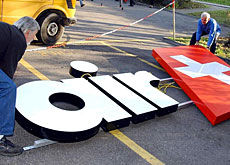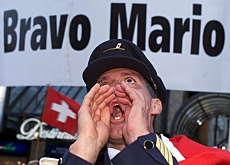Business elite tried over Swissair collapse

More than five years after the collapse of national carrier Swissair, the trial of former board members and top managers of its parent company has begun near Zurich.
The defendants are being tried on mismanagement and other charges over what has become known as the biggest corporate failure in Swiss history – the grounding of the airline in 2001.
The public hearings come more than five years after Swissair collapsed leaving behind debts to the tune of SFr17 billion ($13.7 billion) and resulting in 5,000 job losses.
The prosecution will focus on seven complex cases, in particular the restructuring in 2001 of the SAirGroup which was made up of about 270 different companies. The board had approved a plan by the chief executive of Swissair, Mario Corti, which allegedly led to further debts and financial damages of SFr1.1 billion for creditors.
The entire board also faces charges of having invested €150 million (SFr242 million) into the struggling Belgian carrier, Sabena, at the expense of SAirGroup.
Several defendants are suspected of having lied publicly about the dire financial situation of Swissair and of having made false statements about payments ahead of the grounding of the fleet on October 2, 2001.
Sixteen former members of the board of directors and senior management, including Corti, Philippe Bruggisser and former Credit Suisse boss Lukas Mühlemann, as well as three outside consultants, are to appear in court. The trial is expected to last eight weeks.
One defendant, former chairman Eric Honegger, who was a member of the Zurich cantonal government, is also alleged to have withheld taxes.
Experts expect the defendants to reject most charges.
The lawsuits are seen as a case against business leaders and the former political establishment, notably members of the centre-right Radical Party.
Light sentences?
Daniel Jositsch, professor of law at Zurich University, does not expect the defendants to be punished too severely. “I don’t think anybody will be handed a jail sentence,” he told swissinfo.
Jositsch said the lawsuit was exceptionally complicated and involved millions of business transactions. He added that the court could not rule on the Swissair collapse in all its aspects.
For his part, Karl Hofstetter, also a professor of law at Zurich University, said the penal court was not the right forum to judge the Swissair tragedy as a whole. “In a sense the Bülach court is dealing with side issues because the charges cover only limited facts ” he told swissinfo.
Statute of limitations
He doesn’t expect severe sentences either. “In some cases we could even see acquittals,” Hofstetter said.
It is not known what sentences the prosecution will demand. They could range from fines to a maximum of five years in jail.
Experts also point out that the defendants could seek to extend legal proceedings by appealing against the verdict, as the statute of limitations – which sets a time limit on legal action in certain cases – is seven years.
“The special thing about the case is that it was not business criminals or fraud at work but people who wanted to prevent the demise of Swissair,” said prosecutor Andreas Brunner.
The trial is the first in a series of legal proceedings expected to take place against former members of the Swissair board and management this year.
swissinfo, Urs Geiser
There are 19 defendants, including 16 former members of the Swissair board and the company’s top management.
The trial is expected to last eight weeks; no date for the verdict has been set.
The investigation took five years and produced 280 metres worth of documents.
The prosecution’s indictment is a 100-page document.
Swissair planes were grounded in October 2001, after the company had been in business for 71 years.
The downturn in the aviation market after the terrorist attacks of September 11, 2001, proved the last straw for the heavily indebted Swissair, which folded the following year.
The airline collapsed because it over-extended itself by buying stakes in numerous loss-making airlines, including Belgium’s Sabena and Poland’s Lot, in an attempt to form its own airline alliance.
The remains of Swissair and the regional carrier Crossair were brought together in 2002 to form the new national carrier Swiss, which was in turn taken over by Germany’s Lufthansa in 2005.

In compliance with the JTI standards
More: SWI swissinfo.ch certified by the Journalism Trust Initiative














You can find an overview of ongoing debates with our journalists here . Please join us!
If you want to start a conversation about a topic raised in this article or want to report factual errors, email us at english@swissinfo.ch.